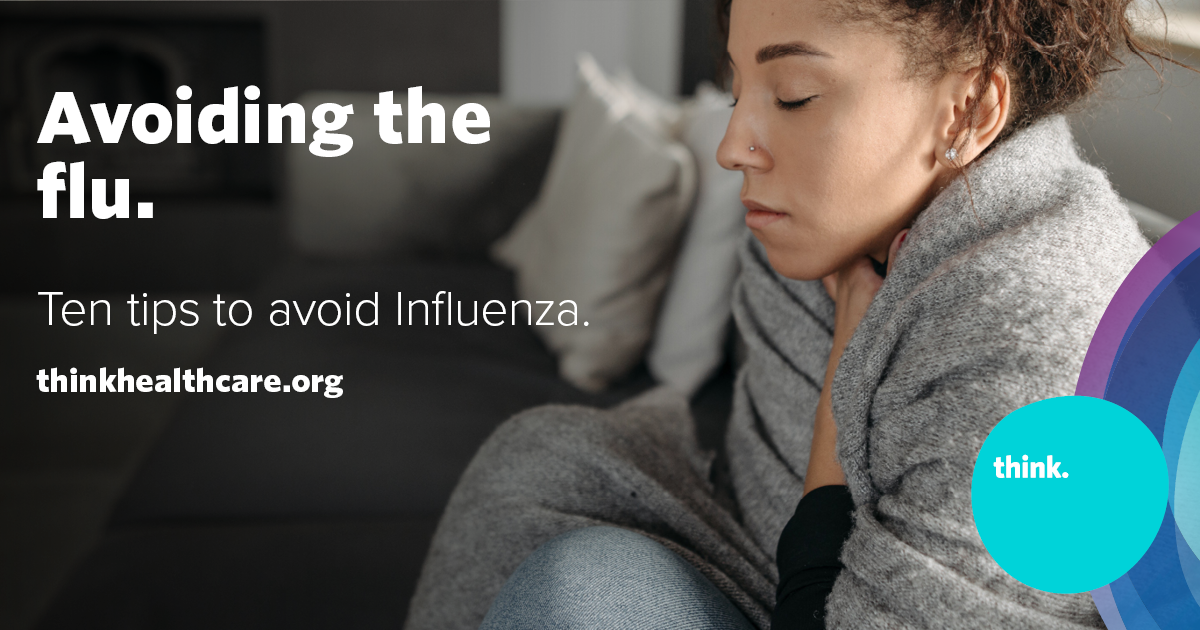Avoiding the flu can be a challenge. Here are ten suggestions that can help you and your family members minimize the chance of catching the flu this season.
Influenza is a highly contagious virus that attacks the respiratory system causing cough, fatigue, shortness of breath, fever, muscle aches, sore throat, and runny noses. Influenza infects millions of Americans annually. There are several ways to avoiding the flu. Here are my top ten that are most effective.
Ten ways to avoiding the flu:
Washing your hands can help avoid the flu.
Next to inhaling influenza, the most common method of contracting the flu is through picking up flu germs on your hands. Germs are picked up and passed on through touching your eyes, mouth or nose. Creating good habits around frequent and proper hand washing (with soap and water) will greatly reduce the chances of contracting the flu. If you have young children, this is an ideal time to help cultivate healthy habits regarding washing your hands. Good handwashing habits are important, especially if children go to daycare or school where they are exposed to groups of children. Remember that hand sanitizer is nice to use, but nothing beats good hand washing!
Avoid touching your eyes, nose and mouth especially during flu season.
Influenza germs access your body through your eyes, nose and mouth. On average an adult touches their face 16 times every hour!
Cover your mouth when you sneeze or cough.
You can pretty much bet that particles from a cough will travel up to 6 feet. Covering your mouth (using your elbow rather than your hand) reduces the distance and can help minimize potential exposure to your neighbors.
Avoid people who may be ill or show symptoms of the flu.
Exposure to people who are sick is one of the fastest ways to getting sick yourself! If you can avoid people who are showing signs of influenza or any sickness, the best course to avoid getting ill is to avoid sick people altogether. If you do have to be around people who are sick, wear a mask, wash your hands and avoid touching your face or getting too close to the person.
Stay home if you are sick or think you have the flu.
The best thing you can do to help reduce the spread of influenza is to not go out if you are sick. Stay home. Some flu viruses are highly contagious and staying home and out of the population, will decrease the opportunity for the virus to spread. If you need medical care, you can schedule a telehealth appointment with your doctor. Think‘s Virtual Care Connection is simple and secure. Get medical care from the comfort of your home.
Rest.
Keep up on your sleep. When our bodies are well-rested, we have the energy to help fight off viruses. If we are fatigued or tired, your body will need to work even harder to maintain everyday operations, oftentimes sacrificing fighting off germs.
Hydrate.
Believe it or not, you can become dehydrated in cold weather and our bodies don’t work properly when they are dehydrated. Do you have trouble drinking enough water? Try our Seven in Seven challenge!
Clean and disinfect areas and surfaces often.
Influenza germs can live up to 3 days on hard surfaces and 8-12 hours on fabric surfaces.
Boost your immune system.
Incorporate exercise, eating fruits and vegetables, and stress reduction into your daily lifestyle. Healthy foods and habits will help your body be as strong as it can, making it hard for the influenza virus to take hold. The healthy activities may not help you completely avoid getting the flu, but it can help reduce the symptoms.
Get your flu shot.
If you only choose to do one of these 10 things, get your flu shot! Influenza vaccinations help your immune system build up antibodies that can fight the flu virus. Each year, Influenza A and B (there are 4 types) mutate and new strains are identified. Therefore, you need to be vaccinated every year. It’s recommended that everyone get a flu shot (unless otherwise directed by your physician). It’s especially important for older folks or people with compromised immune systems to get the flu shot. As always, with all medications, consult your doctor before getting your flu shot!
Where can I get a flu shot?
Think Whole Person Healthcare offers no-appointment walk-in flu shots during our business hours. Bring your ID and insurance card and we can get you vaccinated in less than 10 minutes. Most insurance plans cover flu shots with zero or minimal copay.
